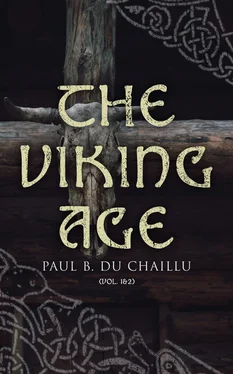We must remember that the Sueones are not mentioned from the time of Tacitus to that of Charlemagne (772–814), and certainly they had not disappeared in the meantime.
What were the Danes doing with their mighty fleets before this? Had their ships been lying in port for centuries? Had they been built for simple recreation and the pleasure of looking at them, or did their maritime power arise at once as if by magic? Such an hypothesis cannot stand the test of reasoning. The turning of a population into a seafaring nation is the work of time. Where in the history of the world can we find a parallel to this story of a people suddenly appearing with immense navies? Let us compare by analogy the statement of the chronicles with what might happen to the history of England in the course of time.
Suppose that for some reason the previous history of England were lost, with the exception of a fragment which spoke of her enormous fleet of to-day. Could it be reasonably supposed that this great maritime power was the creation of a few years?
A few years after the time fixed as that of their first supposed appearance we find these very Danes swarming everywhere with their fleets and warriors, not only in England, but in Gaul, in Brittany, up the Seine, the Garonne, the Rhine, the Elbe, on the coasts of Spain, and further eastward in the Mediterranean.
The Sueones, or Swedes, reappear at the close of the eighth and commencement of the ninth centuries by the side of the Danes, and both called themselves Northmen. Surely the maritime power of the Sueones, described by Tacitus, could not have been destroyed immediately after his death, only to reappear in the time of Charlemagne, when it again becomes prominent in the Frankish annals.
A remarkable fact not to be overlooked is that, in the time of Charlemagne, the Franks and Saxons were not a seafaring people, though their countries had an extensive coast with deep rivers. The Frankish annals never mention a Frank or Saxon fleet attacking the fleets of the Northmen, or preventing them from ascending their streams, though Charlemagne ordered ships to be built in order to resist their incursions.
While the country of the Saxons was being conquered by this Emperor, we find that the Saxons themselves had no vessels on the Elbe or Weser in which, if defeated, they could retire in safety, or by help of which they could prevent the army of their enemies from crossing their streams. Such tactics were constantly used by the Northmen in their invasions of ancient Gaul, Britain, Germania, Spain, &c.
Thus we see that, though hardly more than three hundred years had elapsed since the time when, according to the Roman writers, the fleets of the Franks and Saxons swarmed over every sea of Europe, not a vestige of their former maritime power remained in the time of Charlemagne, and the Saxons were still occupying the same country as in the days of Ptolemy.
Pondering over the above important facts, the question arises: Were not the Romans mistaken in giving the names of Saxons and Franks to the maritime tribes of whose origin, country, and homes they knew nothing, but who came to attack their shores? Were not these so-called Saxons and Franks in reality tribes of Sueones, Swedes, Danes, Norwegians? The Romans knew none of the countries of these people. It seems strange, if not incredible, to find two peoples, whose country had a vast sea-coast and deep rivers, totally abandoning the seafaring habits possessed by their forefathers.
It cannot be doubted that Ivar Vidfadmi, after him Harald Hilditönn, then Sigurd Hring and Ragnar Lodbrok and his sons, and probably some of the Danish and Swedish kings before them, made expeditions to England, and gained and held possessions there. Several distinct records, having no connection with each other, being parts of different Sagas and histories, with the archæology, form the evidence.
“Ivar Vidfadmi (wide-fathomer) subdued the whole of Sviaveldi (the Swedish realm); he also got Danaveldi (Danish realm) and a large part of Saxland, and the whole of Austrriki (Eastern realm, including Russia, &c.) and the fifth part of England. From his kin have come the kings of Denmark and the kings of Sweden who have had sole power in these lands” (Ynglinga Saga, c. 45).
The above is corroborated by another quite independent source.
“Ivar Vidfadmi ruled England till his death-day. As he lay on his death-bed he said he wanted to be carried to where the land was exposed to attacks, and that he hoped those who landed there would not be victorious. When he died it happened as he said, and he was mound-laid . It is said by many men that when King Harald Sigurdsson came to England he landed where Ivar’s mound was, and he was slain there. When Vilhjálm Bastard came to the land he broke open the mound of Ivar and saw that the corpse was not rotten; he made a large pyre, and had Ivar burned on it; then he went up on land and got the victory” (Ragnar Lodbrók’s Saga, c. 19).
We find that not only did the Norwegians call themselves Northmen, but that both Danes and Sueones were called Northmen in the Frankish Chronicles. 18
“The Danes and Sueones, whom we call Northmen, occupy both the northern shore and all its islands.”
So also Nigellus (in the reign of Louis Le Debonnaire). 19
“The Danes also after the manner of the Franks are called by the name of Manni.”
The time came when the people of the North, continuing their expeditions to Britain, attacked their own kinsmen. After the departure of the Romans the power of the new comers increased, and as they became more numerous, they became more and more domineering: the subsequent struggles were between a sturdy race that had settled in the country and people of their own kin, and not with Britons, who had been so easily conquered by the Romans, had appealed to them afterwards for protection, and had for a long period been a subject race. It is not easy to believe that the inhabitants of a servile Roman province could suddenly become stubborn and fierce warriors, nor are there any antiquities belonging to the Britain of yore which bear witness to a fierce and warlike character displayed by the aboriginal inhabitants.
From the preceding pages we see that Franks and Saxons are continually mentioned together, and it is only in the North we can find antiquities of a most warlike and seafaring people, who must have formed the great and preponderating bulk of the invading host who conquered Britain.
Britain after a continuous immigration from the North, which lasted several hundred years, became the most powerful colony of the Northern tribes, several of whose chiefs claimed a great part of England even in the seventh century. Afterwards she asserted her independence, though she did not get it until after a long and tedious struggle with the North, the inhabitants and kings of which continued to try to assert the ancient rights their forefathers once possessed. Then the time came when the land upon which the people of these numerous tribes had settled became more powerful and more populous than the mother country; a case which has found several parallels in the history of the world. To-day the people of England as they look over the broad Atlantic may perhaps discern the same process gradually taking place. In the people of the United States of North America, the grandest and most colossal state founded by England or any other country of which we have any historical record, we may recognise the indomitable courage, the energy and spirit which was one of the characteristics of the Northern race to whom a great part of the people belong. The first settlement of the country, territory by territory, State by State—the frontier life with its bold adventures, innumerable dangers, fights, struggles, privations and heroism—is the grandest drama that has ever been enacted in the history of the world. The time is not far distant, if the population of the United States and Canada increases in the same ratio as it has done for more than a hundred years, when over three or four hundred millions of its people will speak the English tongue; and I think it is no exaggeration to say that in the course of time one hundred millions more will be added, from Australia, New Zealand and other colonies which to-day form part of the British Empire, but which are destined to become independent nations. In fact we hesitate to look still further into the future of the English race, for fear of being accused of exaggeration.
Читать дальше












